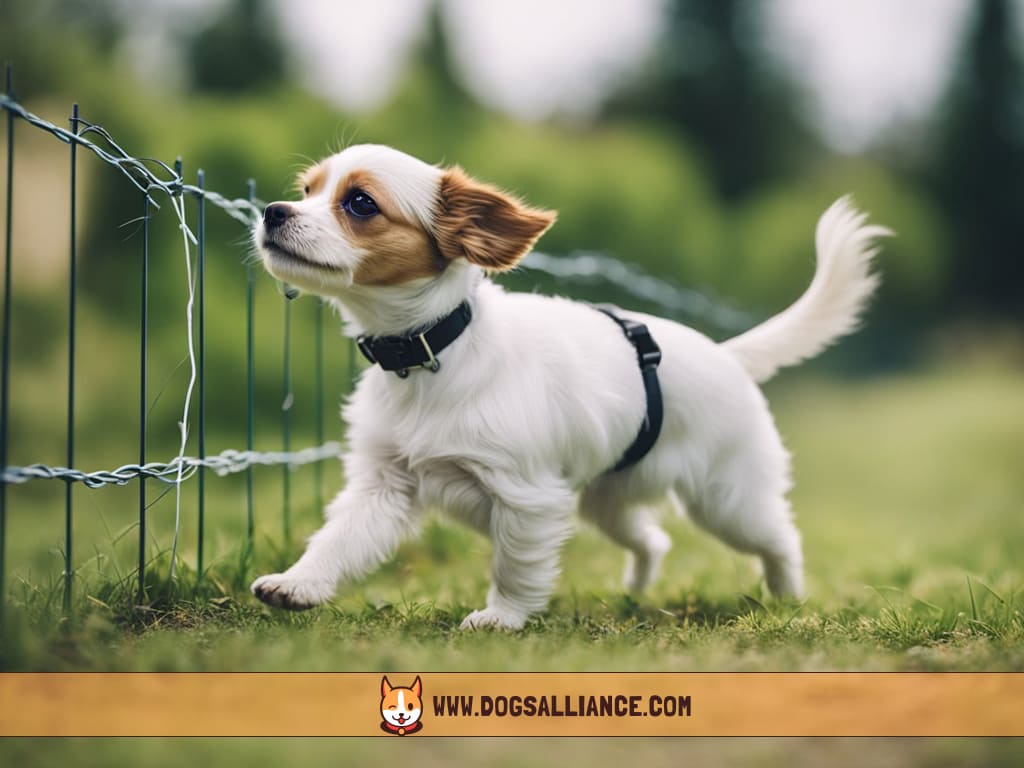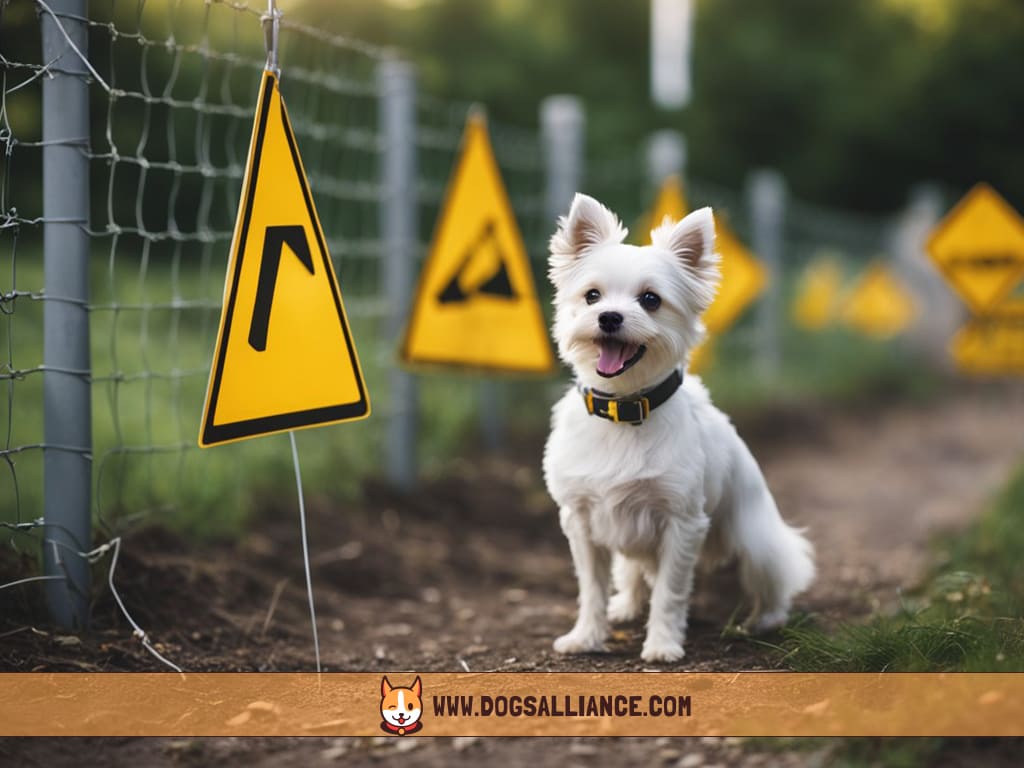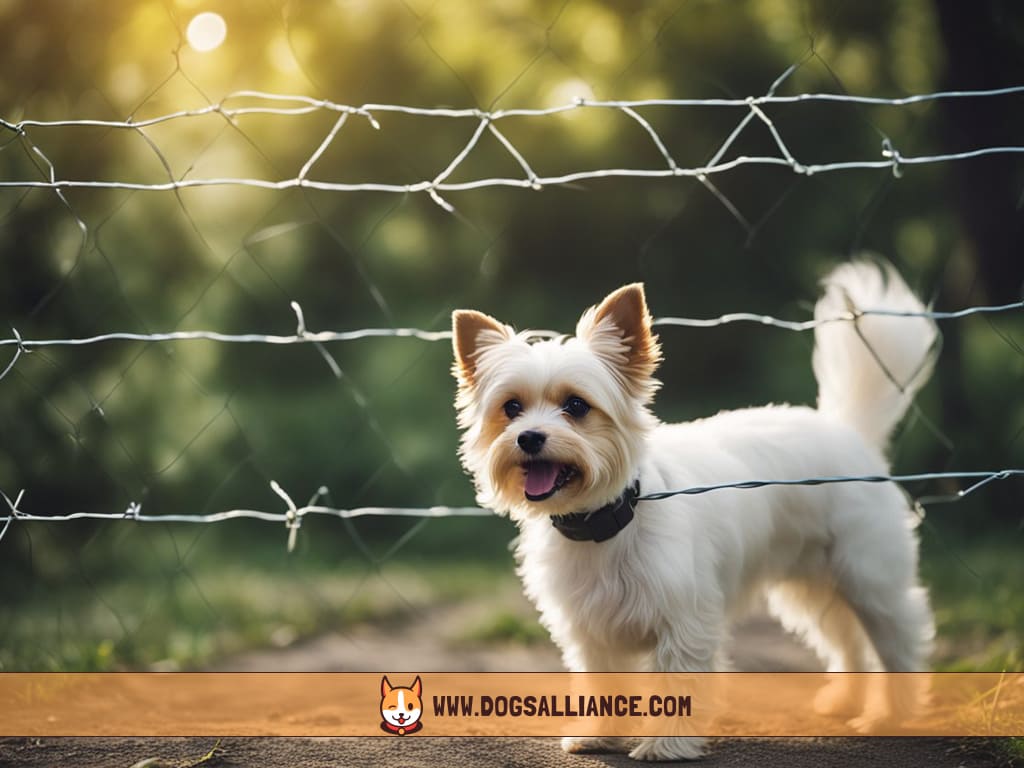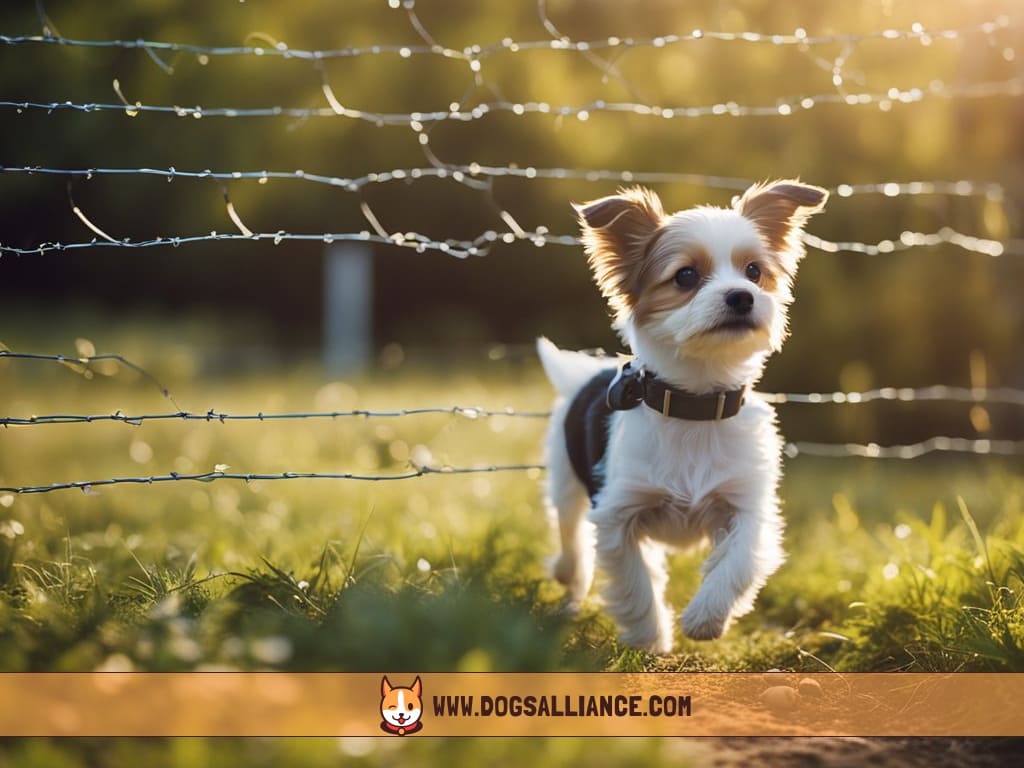
When exploring options for keeping your small dog safely within the boundaries of your property, you might consider an electric fence, also known as an invisible fence.
These systems are designed to offer a flexible and cost-effective solution by providing a hidden barrier that does not interrupt the aesthetics of your landscape.
They usually consist of a wire buried along the perimeter of your desired boundary, a transmitter, and a collar that your dog wears.
The safety of electric fences for small dogs is contingent on several factors including proper installation, training, and the specific characteristics and needs of your dog.
Training is a crucial component, as it ensures that your small dog understands and respects the boundaries set by the fence.
Without appropriate training, a dog may not learn to avoid the warning beeps and subsequent static correction the system uses to deter them from crossing the boundary.

It’s important to weigh the advantages and disadvantages tailored to the size and temperament of your dog.
For small dogs, there’s a risk that the static correction may be too intense, or they might be more prone to escaping or developing behavioral issues.
Therefore, ensure that any system you consider can be adjusted to account for a smaller dog’s size and sensitivity.
The objective is to keep your pet secure while avoiding any potential physical or psychological harm.
Understanding Electric Fences for Small Dogs
Electric fences can offer a balance between safety and freedom for your small dog but require careful consideration to ensure they are a suitable measure.
How Electric Fences Work?
Electric fences for dogs operate by sending a signal to a receiver collar that your dog wears.
When your dog approaches the boundary that you’ve set, the collar emits a warning sound.
If your dog continues closer to the boundary, it receives a mild electric shock, which is intended to be startling but not harmful.
- Signal emitter: Installs onto a physical fence or buried underground to create an invisible boundary.
- Receiver collar: Your small dog wears this collar, which reacts to the boundary signal.
- Correction levels: Typically adjustable, allowing you to set the intensity of the static correction according to your dog’s size and temperament.
Suitability for Small Breeds
The suitability of electric fences for small breeds hinges on several factors:
- Sensitivity: Smaller dogs are often more sensitive to electric stimulation. Therefore, the shock level must be adjustable to a lower setting to ensure safety and humane treatment.
- Collar fit: Invisible fence collars designed for small dogs are crucial. They ensure that the contact points sit correctly against your dog’s skin.
Key factors to ensure safety:
- Ensure that you choose an electric fence system that can be adjusted to a low intensity suitable for small dogs.
- The system includes a receiver collar specifically designed for small breeds, known as a ‘small dog electric fence collar’ or an ‘invisible fence small dog collar.
Types of Electric Dog Fences
There are multiple types of electric dog fences suitable for small dogs, each with distinct considerations:
- Wireless electric fences: Require less installation effort as they create a circular boundary around a central transmitter.
- In-ground electric fences: Involve burying a wire in your desired boundary shape but offer more customization in layout.
- Above-ground electric fences: Similar to in-ground but with the wire placed above the surface, sometimes attached to an existing physical barrier.
- Installation: Wireless systems are typically easier to install than in-ground or above-ground systems.
- Customizability: In-ground and above-ground systems offer more flexibility in shaping the boundaries to accommodate your property’s layout.
By selecting the right type of electric dog fence and ensuring you have a system and collar appropriate for small breeds, you can create a secure environment for your small dog to enjoy.
Safety Concerns and Considerations
When considering an electric fence for your small dog, it’s crucial to be aware of potential safety risks and how they can impact your dog’s physical and psychological well-being.

Risk of Injury or Harm
Small electric dog fences might be convenient, but they are not entirely without risk.
If your small dog ignores the boundaries set by an electric fence, it may receive an electric shock, which can vary in intensity.
Smaller breeds, which could be more sensitive to the shock, may find the experience distressing, even though modern electric fences are designed to avoid causing physical injury.
Size and Weight of Collars
The electric fence system includes a collar that your small dog must wear.
These collars can be bulky, and for small dogs, the weight and size of the collar may cause discomfort. Ensure the collar is:
- Properly fitted: It should not be too tight or too loose.
- Appropriate for the dog’s size: The collar should not hinder the dog’s movement or cause strain on their neck.
Behavioral Impact on Small Dogs
An electric fence can affect your small dog’s behavior.
Receiving an unexpected shock can lead to confusion or fear, potentially causing behavioral issues over time. Small dogs may:
- Start to associate the shock with their surroundings, leading to anxiety even in safe areas.
- React negatively to the beeping or shock, which may impact their overall temperament and behavior outside of the fence’s boundaries.
For small dogs, the use of an electric fence requires careful consideration of these safety and behavioral factors to ensure that the solution is both humane and effective for your pet.
Installation and Configuration
When installing an electric fence for small dogs, the focus should be on the proper setup of the system in small yards and meticulous tuning of collar settings to ensure safety and efficiency.
Setting Up in Small Yards and Areas
For small yards, mapping out the perimeter where the electric fence will be effective is crucial. You’ll start by:
- Measuring your yard: Determine the specific dimensions of the area you want to contain your dog in.
- Planning the layout: During the layout planning, identify the locations for burying the wires and placing the main transmitter to achieve consistent signal coverage throughout the area.
It’s essential to ensure that you install the electric dog fence for small yards without any signal interference that could create gaps or weak spots in the boundary.
Configuring Collar Settings and Boundaries
To properly configure your electric dog fence:
- Set boundary width: Adjust the boundary signal width on the transmitter—usually between a few inches to a few feet.
- Test the collar: Wear the test light tool, walk towards the boundary and make sure the collar beeps and corrects at the right spot.
- Adjust collar settings for a small dog: Start with the lowest correction setting and only increase if necessary, observing your dog’s behavior for signs of distress or non-compliance.
Fine-tuning the fence to the temperament and size of your small dog ensures a balance between safety and correction.
Remember, consistent training with the collar is key for your dog to understand where the safe area ends.
Selecting the Best Electric Fence for Small Dogs
Choosing an electric fence for your small dog requires attention to brand, model differences, battery life, and maintenance for safety and convenience.

Comparing Different Brands and Models
- PetSafe Stay & Play Compact Wireless Fence: Ideal for small dogs with a lightweight collar designed for comfort. Provides a secure play area without the need for buried wires.
- PetSafe Stubborn Dog In-Ground Fence: A reliable system that includes adjustable levels of correction, suitable for even small dogs that are determined escapists.
When comparing different brands and models, prioritize systems specifically designed for small dogs. Focus on key factors such as the gentleness of the correction, the adjustability of the collar, and whether the system can be tailored to your specific yard size.
Ensure that high-quality models offer adjustable correction levels that are safe for small dogs, ensuring their training is conducted without harm.
Battery Life and Maintenance Requirements
| Brand/Model | Battery Type | Battery Life | Maintenance Notes |
|---|---|---|---|
| PetSafe Stay & Play Compact Wireless Fence | Rechargeable | 2-3 weeks | Monthly collar inspection is advised. |
| PetSafe Stubborn Dog In-Ground Fence | Standard 9-Volt or Deluxe | 1-3 months | Periodic battery replacement required. |
For ease of ongoing use, select a fence with a long-lasting battery to minimize frequent changes or recharging sessions.
Models with a rechargeable battery, such as the PetSafe Stay & Play, provide convenience and are often more cost-efficient in the long run.
Regular maintenance, including collar inspection and battery checks, is critical to ensure the system remains reliable and safe for your small dog.
Additional Features and Accessories
When considering electric fences for your small dogs, specific features and accessories can enhance the safety and convenience of the containment system.

GPS and Wi-Fi Enabled Fences
GPS-enabled electric fences offer precision in tracking your dog’s location, ensuring that you know their whereabouts even if they manage to stray.
Wi-Fi connectivity allows for real-time monitoring and control via your smartphone, giving you peace of mind knowing that you can adjust settings or check in on your pet anytime.
- Precision: Track your small dog’s position with GPS accuracy.
- Control: Change settings or check your pet’s status remotely via Wi-Fi.
Portable Solutions for Travel
For small dog owners on the move, portable electric fences provide a flexible containment option.
These systems are easy to set up and adapt to various environments, from campgrounds to rest areas, ensuring your dog’s safety on the go.
- Convenience: Easily pack and transport your portable fence.
- Adaptability: Set up a secure area for your small dog in different locations.
Wireless electric dog fences are particularly suitable for travel, as they eliminate the need for complex installations. The ability to quickly establish a safe boundary allows you to protect your small dog efficiently, wherever your travels may take you.
Frequently Asked Questions
In this section, you’ll find targeted insights addressing safety concerns and correcting any false beliefs regarding electric fences for small dogs.



